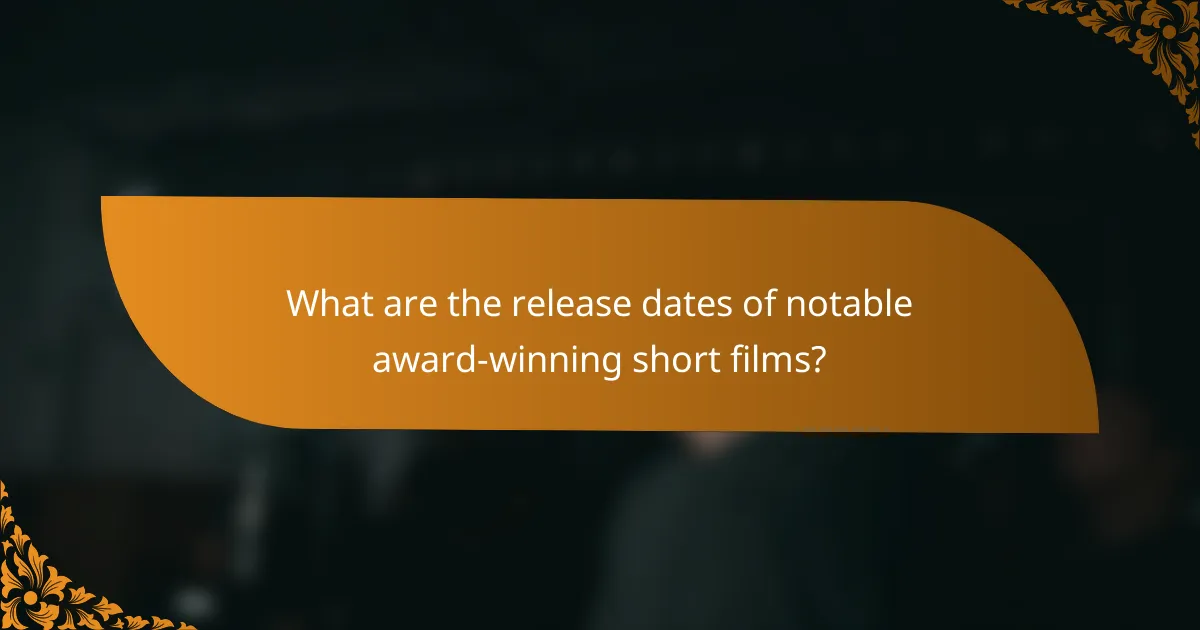
What are Award-Winning Short Films?
Award-winning short films are short films that have received recognition through various film festivals or awards. These films typically demonstrate exceptional storytelling, creativity, and technical skill. They often explore diverse themes and narratives within a limited runtime, usually under 40 minutes. Recognition can come from prestigious events such as the Academy Awards, Cannes Film Festival, or Sundance Film Festival. Winning accolades often boosts a film’s visibility and can lead to further opportunities for filmmakers. Statistics show that award-winning short films frequently garner attention for their innovative approaches to filmmaking.
Why do short films receive awards?
Short films receive awards due to their ability to convey powerful narratives in a limited timeframe. They often showcase innovative storytelling techniques and creativity. Their concise format allows filmmakers to experiment with ideas and styles. Awards recognize these artistic achievements and encourage future creativity. Festivals like Sundance and Cannes highlight exceptional short films annually. Winning awards can significantly boost a filmmaker’s career. According to the Academy Awards, short films have categories specifically dedicated to recognize this medium. This acknowledgment reinforces the importance of short films in the cinematic landscape.
What criteria are used to judge short films?
Short films are judged based on several criteria. These criteria include storytelling, cinematography, editing, sound design, and acting performances. Storytelling evaluates the narrative structure and emotional impact. Cinematography assesses visual composition and camera work. Editing looks at the pacing and flow of the film. Sound design considers the quality and effectiveness of audio elements. Acting performances are judged on the believability and skill of the actors. Each of these criteria contributes to the overall effectiveness and artistic merit of the short film.
Which organizations grant awards for short films?
Organizations that grant awards for short films include the Academy of Motion Picture Arts and Sciences, which presents the Oscars. The Cannes Film Festival awards the Palme d’Or for short films. The Sundance Film Festival recognizes excellence in short filmmaking as well. The Tribeca Film Festival also offers awards specifically for short films. Additionally, the BAFTA awards feature categories for short films. The Berlin International Film Festival honors short films with the Golden Bear award. Each of these organizations plays a significant role in celebrating the art of short filmmaking.
How do release dates impact the success of short films?
Release dates significantly impact the success of short films. Timing can influence audience engagement and festival acceptance. Releasing during peak film festival seasons increases visibility. For instance, many prestigious festivals occur in the fall. A strategic release can align with themes relevant to current events. This relevance can attract more viewers. Additionally, the competition landscape varies throughout the year. Fewer releases during certain months can enhance a film’s chances of being noticed. Studies show that films released during major holidays often perform better due to increased audience availability. Thus, careful consideration of release dates is crucial for maximizing success.
What is the significance of a film’s release date?
A film’s release date is significant because it influences audience reception and box office performance. The timing can affect competition with other films. Certain dates, like holidays or summer, attract larger audiences. Historical data shows that films released during peak seasons often earn more revenue. Additionally, release dates can align with award seasons, impacting a film’s chances for nominations. For example, films released in late fall often qualify for the Oscars. Thus, strategic release dates can enhance a film’s visibility and success.
How do festivals influence the release schedule of short films?
Festivals significantly influence the release schedule of short films. Many filmmakers time their releases to coincide with major film festivals. This strategy maximizes visibility and audience engagement. Festivals often serve as platforms for premieres, enabling filmmakers to showcase their work to industry professionals. Additionally, awards won at festivals can enhance a film’s reputation and marketability. Filmmakers may choose to delay a release until after a festival to capitalize on potential accolades. This practice can lead to increased distribution opportunities and audience interest. Historical data shows that films premiered at prestigious festivals often see higher box office returns.
What themes are common in award-winning short films?
Common themes in award-winning short films include identity, love, and loss. Many films explore the complexities of personal identity. They often depict characters grappling with who they are in society. Love is another prevalent theme, showcasing various forms of relationships. These films frequently highlight romantic, familial, and platonic love. Loss is also significant, addressing grief and the impact of losing loved ones. Other themes include social issues, such as inequality and injustice. Award-winning short films often use these themes to provoke thought and evoke emotion. These patterns have been observed in numerous film festivals and award ceremonies globally.
How do themes enhance storytelling in short films?
Themes enhance storytelling in short films by providing a central message or idea. They guide the narrative direction and emotional tone. Themes help to create connections between characters and audiences. They also establish the underlying conflict and resolution within the story. For example, a theme of redemption can lead to a transformative character arc. In award-winning short films, clear themes often resonate with viewers, making the story memorable. Research shows that films with strong thematic elements tend to receive higher audience engagement and critical acclaim. Thus, themes play a crucial role in the effectiveness of short film storytelling.
What are some notable themes found in recent award-winning short films?
Notable themes in recent award-winning short films include identity, social justice, and mental health. Many films explore personal and cultural identity, showcasing diverse backgrounds and experiences. Social justice themes often address issues like inequality and discrimination, prompting audiences to reflect on societal challenges. Mental health is frequently depicted, illustrating struggles and resilience in characters. These themes resonate with contemporary audiences and reflect current societal conversations. Recent award winners have successfully highlighted these themes, contributing to their recognition and acclaim in film festivals.

What are the release dates of notable award-winning short films?
It is not possible to provide a comprehensive list of release dates for notable award-winning short films. The term “notable” is subjective and varies widely. Additionally, award-winning short films encompass various festivals and awards, each with different timelines. Specific examples include “The Silent Child,” which won an Academy Award in 2018, and was released in 2017. Another example is “Dear Basketball,” which was released in 2017 and won an Academy Award in 2018. Without a defined list of films, it is challenging to provide accurate release dates.
How can I find the release dates of specific award-winning short films?
To find the release dates of specific award-winning short films, you can use several reliable resources. Film databases like IMDb provide detailed information, including release dates. Additionally, official film festival websites often list award-winning films along with their release information. You can also check streaming platforms that feature short films, as they frequently include release dates in their film descriptions. Film industry publications and news articles may also report on the release dates of notable short films.
What resources are available for tracking film release dates?
IMDb provides comprehensive film release date information. It includes a searchable database of films and their scheduled release dates. Box Office Mojo tracks box office performance and release schedules. Rotten Tomatoes aggregates reviews and release dates for films. Fandango offers ticket purchasing options along with release date information. The official websites of film studios often list upcoming releases. Film industry trade publications like Variety and The Hollywood Reporter frequently report on release schedules. These resources are widely used by audiences and industry professionals to stay informed about film releases.
How do historical release dates affect a film’s legacy?
Historical release dates significantly influence a film’s legacy. The context of a film’s release can shape audience perception and critical reception. For instance, films released during significant cultural or political events often resonate more deeply. They may be viewed as reflections of their time, enhancing their relevance. Additionally, the timing can affect awards and recognition. Films released in competitive seasons may overshadow others, impacting their legacy. Historical context also allows for retrospective analysis. Over time, a film’s themes may gain new significance based on societal changes. Thus, the release date plays a crucial role in the lasting impact of a film.
What trends are observed in the release dates of short films?
Short films are increasingly released during film festivals and award seasons. This trend aligns with the heightened visibility during these events. Many filmmakers aim to capitalize on the attention surrounding festivals like Sundance and Cannes. Additionally, there is a rise in digital releases on platforms like YouTube and Vimeo. This shift allows filmmakers to reach audiences directly. Furthermore, short films are often released in thematic bundles or collections. These collections may coincide with specific dates or cultural events. Overall, short films are strategically timed to maximize audience engagement and recognition.
How do seasonal trends affect short film releases?
Seasonal trends significantly affect short film releases. Filmmakers often align their releases with specific seasons to maximize audience engagement. For instance, holiday-themed films are typically released in December. Summer releases may target family audiences during school vacations. Festivals also influence release timing, as many short films premiere at events like Sundance in January. Research indicates that films released during peak viewing seasons tend to perform better. Data from the Motion Picture Association shows that summer and holiday periods account for the highest box office revenues. Thus, understanding seasonal trends helps filmmakers strategically plan their short film releases.
What patterns emerge in award-winning short film release dates over the years?
Award-winning short films often follow distinct release patterns over the years. Many notable short films are released in the fall, coinciding with major film festivals. Festivals like Sundance and Cannes often showcase award-winning shorts, leading to increased visibility. Additionally, many films are released in the spring to qualify for the upcoming awards season.
A trend shows that films released in the latter half of the year often receive nominations and wins. The data indicates that films released between September and December have a higher likelihood of being recognized. This pattern aligns with the timing of major awards ceremonies, such as the Oscars.
Furthermore, the frequency of releases tends to spike in years with significant cultural events or movements. For example, films addressing social issues often gain traction during election years. This correlation highlights how societal context influences release timing and award recognition.

How do the themes of award-winning short films relate to their release dates?
The themes of award-winning short films often reflect contemporary societal issues relevant to their release dates. For example, films addressing climate change gained prominence around 2019, coinciding with increased global awareness of environmental issues. Similarly, narratives focusing on social justice emerged more frequently in 2020, aligning with worldwide protests and movements. Short films released during significant cultural moments tend to resonate more with audiences. This connection enhances their chances of receiving awards, as juries often favor works that engage with current themes. Thus, the timing of a film’s release can significantly influence its thematic content and recognition.
What role do contemporary issues play in the themes of short films?
Contemporary issues significantly influence the themes of short films. They provide relevant context that resonates with audiences. Short films often address social, political, and environmental topics. These themes reflect current societal challenges and cultural conversations. For example, films addressing climate change have gained prominence in recent years. This relevance can enhance viewer engagement and emotional impact. Additionally, contemporary issues can foster discussions and raise awareness. Filmmakers use these themes to provoke thought and inspire change.
How do filmmakers use release timing to enhance thematic relevance?
Filmmakers strategically use release timing to enhance thematic relevance by aligning film launches with societal events or cultural moments. This approach maximizes audience engagement and amplifies the film’s message. For instance, films addressing social issues may be released during awareness months or significant anniversaries related to those themes. Historical context also plays a role; releasing a film during a politically charged period can deepen its impact. Research shows that films released during major events often see increased box office performance. This correlation suggests that timing can elevate the film’s relevance and resonance with viewers.
What are some practical tips for exploring themes in award-winning short films?
To explore themes in award-winning short films, focus on analyzing narrative structure and character development. Identify recurring motifs that appear throughout the film. Pay attention to cinematography and sound design, as they enhance thematic elements. Take notes on dialogue and visual symbolism that convey deeper meanings. Research the filmmakers’ backgrounds to understand their influences and intentions. Compare themes across multiple films to identify trends and variations. Engage in discussions with others to gain different perspectives on the themes presented. Lastly, review critiques and analyses from film scholars to enrich your understanding of thematic depth.
How can viewers analyze themes in short films effectively?
Viewers can analyze themes in short films effectively by identifying recurring motifs and symbols. They should pay attention to the narrative structure and character development. Analyzing dialogue and visual storytelling is also crucial. Viewers can take notes on emotional responses during key scenes. Understanding the context of the film’s creation enhances theme analysis. Researching the filmmakers’ backgrounds can provide additional insights. Engaging in discussions with others can deepen understanding of themes. Utilizing film analysis frameworks can guide viewers in their exploration. These methods are supported by film studies literature, which emphasizes active engagement for deeper comprehension.
What methods can be used to connect release dates with thematic exploration?
Methods to connect release dates with thematic exploration include analyzing historical context and audience reception. Historical context involves examining the socio-political climate during the release date. For example, films released during significant events may reflect or critique those circumstances. Audience reception can be studied through box office performance and critical reviews. These metrics often indicate how well themes resonate with viewers at the time of release. Additionally, thematic trends can be identified by comparing multiple films released in the same period. This allows for a broader understanding of the themes prevalent in that timeframe. Data from film festivals often highlight themes recognized by juries, linking them to specific release dates. These methods provide a structured approach to understanding the interplay between timing and thematic content in cinema.
The main entity of the article is “award-winning short films,” which are recognized for their exceptional storytelling and technical skill at various film festivals. The article provides an overview of the criteria used to judge these films, the organizations that grant awards, and the impact of release dates on their success. It also explores common themes found in award-winning short films, such as identity and social justice, and discusses how these themes relate to their release timing. Additionally, the article highlights practical methods for analyzing themes and connecting them with release dates, emphasizing the significance of contemporary issues in short filmmaking.


